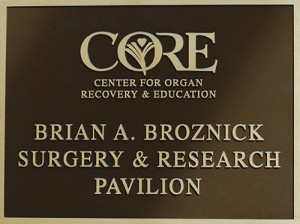Donation for Research
The Center for Organ Recovery & Education (CORE) is dedicated to assisting researchers in academic medical centers, universities, biotechnology centers and hospitals to advance the field of medical research through organ, tissue and eye donation. Progress in treating common and rare diseases often hinges on access to both normal and diseased human tissues.

CORE strives to provide our donor families with opportunities to donate organs, tissue and eyes for research that otherwise could not be utilized for transplant. For our donor families, the opportunity to donate for research that may lead to new treatments or cures offers comfort and hope.
In October, 2012 CORE moved into its state of the art Brian Broznick Surgical Suites and Research Pavilion where physicians and experienced recovery staff are able to recover and prepare grafts for research. Examples include whole and partial organs, such as heart, liver, kidney, lungs, as well as tissue and eyes.
Your family may request information from CORE on the types of studies benefiting from your gift. Following are a few examples of how your gift can help advance research.
Ocular Tissue
- Age-related macular degeneration
- Diabetic retinopathy
- Glaucoma
Organs

- Heart conditions such as coronary artery disease and heart failure
- Pancreas islet cells for diabetes treatment
- Kidney diseases such as chronic kidney disease, diabetes and metabolic disorders
- Liver diseases such as viral hepatitis, cancer, cirrhosis and biliary atresia
- Lung diseases such as cystic fibrosis, pulmonary hypertension, COPD and LAM.
- Bladders and prostates for conditions such as urinary incontinence and cancer
Tissues
- New cancer drug targets and biomarkers
- Determine whether stem cells can be used to generate new tissue treatment methodologies or replacement therapies such as engineer tissue for vascular grafts or bladder slings
- Pain management modalities
- Advanced treatments for sports injuries such as torn anterior crucial ligaments
- Gene expression studies (GTEx) provides valuable insights to increase our understanding of how changes in our genes contribute to common diseases, in order to improve healthcare for future generations
